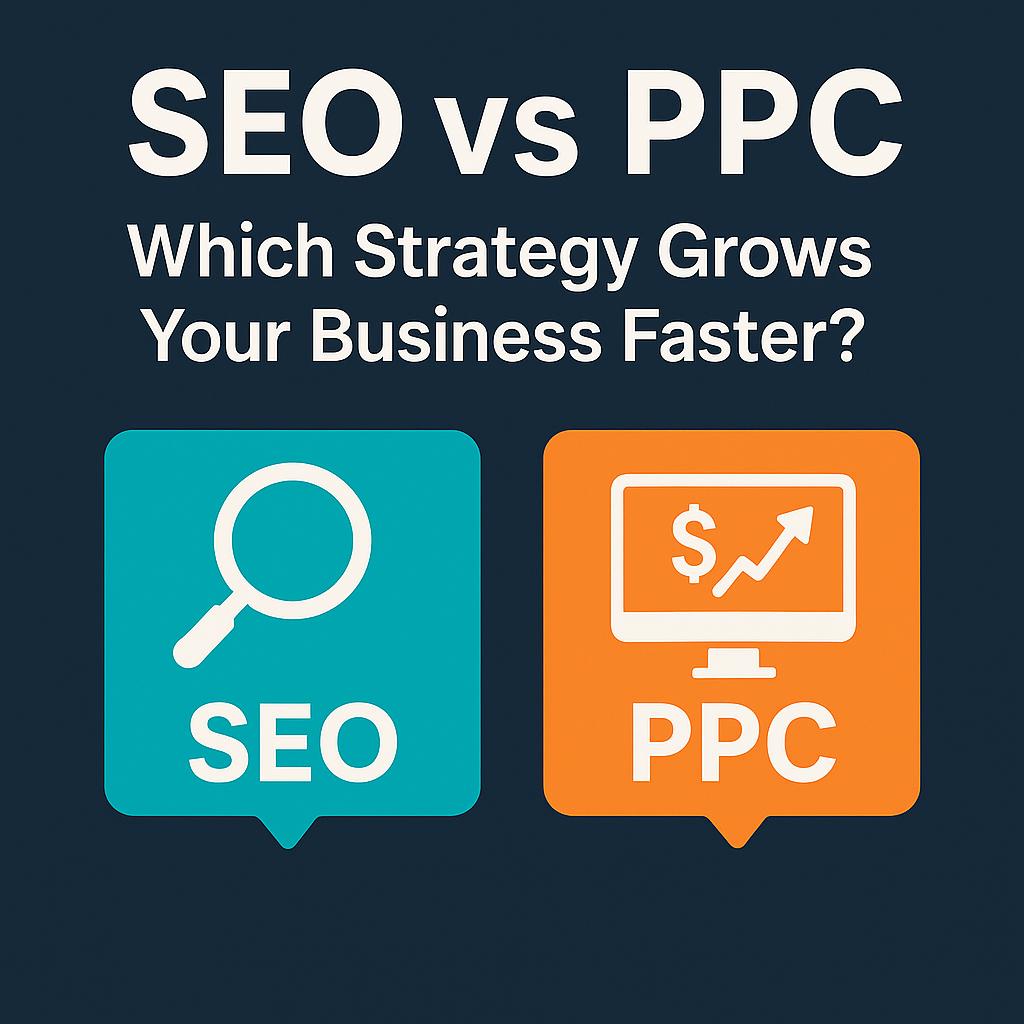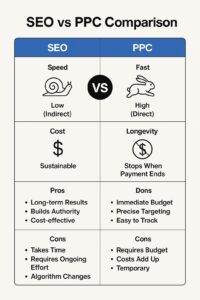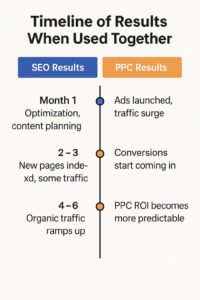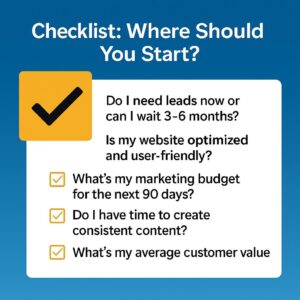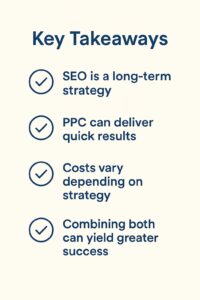Introduction
When it comes to SEO vs PPC, business owners often feel stuck trying to decide which path leads to faster growth. Search Engine Optimization (SEO) brings in organic traffic over time, while Pay-Per-Click (PPC) ads get your business in front of eyeballs almost instantly.
But which one is the right move for your business?
This decision can make or break your marketing success. Whether you’re a small startup or a growing mid-sized business, choosing the wrong channel can mean wasted budget, lost time, and minimal returns.
At Nesace Media, we’ve helped dozens of clients grow using both SEO and PPC. By the end of this article, you’ll not only understand the difference — you’ll know exactly which approach to take. Stick around for our expert recommendation.
SEO vs PPC: Key Differences
Understanding the difference between SEO vs PPC starts with knowing how each one works.
How They Work:
| Feature | SEO (Search Engine Optimization) | PPC (Pay-Per-Click Advertising) |
|---|---|---|
| Traffic Type | Organic (free clicks) | Paid (charged per click) |
| Visibility | Gradual, builds over time | Instant, starts right after payment |
| Cost Structure | Time & effort (indirect cost) | Direct cost per click or impression |
| ROI Timeline | Long-term investment | Short-term, immediate returns |
| Control | Less control over ranking | Full control over targeting |
Pros and Cons of Each
SEO Pros
- Long-term, compounding results
- Builds authority and trust
- More cost-effective over time
SEO Cons
- Slow to start
- Requires consistent updates
- Algorithm changes can impact visibility
PPC Pros
- Instant visibility
- Precise targeting options
- Easy to measure and adjust
PPC Cons
- Expensive in competitive markets
- Stops working when budget ends
- Click fraud risk
Infographic: SEO vs PPC Comparison
Key Takeaway:
SEO takes time but keeps paying off. PPC gets fast results but requires ongoing spend. Your goals, timeline, and budget will determine the right mix.
SEO: The Long-Term Play
Let’s dig into why SEO is the marathon runner of your marketing strategy.
Benefits of SEO for Sustained Growth
- Builds steady organic traffic
- Positions your business as a trusted authority
- Grows brand visibility in search results
- Supports every stage of the customer journey
Over time, SEO can bring leads month after month without spending more on ads.
How Long Does SEO Take?
Results usually begin within 3–6 months, but peak performance often shows after 12+ months. It depends on competition, your current site health, and how consistent you are with optimization.
Key SEO Tasks You Can’t Skip
- On-Page SEO: Optimizing page titles, headers, content, and internal links
- Off-Page SEO: Earning backlinks and social shares
- Content SEO: Publishing high-quality blog posts and landing pages
- Technical SEO: Speed, mobile-friendliness, crawlability, and site structure
Check out these top SEO best practices for blog content for a more detailed guide.
Real-World Example from Nesace Media
One client — a local travel advisor — had an outdated website with no Google rankings. After Nesace Media rebuilt the site, optimized every page, and launched a local SEO campaign, their monthly traffic grew by 325% in under 8 months. Leads increased steadily — without any paid ads.
“SEO became the engine behind their long-term growth,” says Titonian Wallace Sr., CEO of Nesace Media.
Key Takeaway:
SEO rewards consistency. If you’re planning to stick around in your market, SEO is how you build roots.
PPC: The Fast-Track Strategy
Sometimes, you don’t have months to wait for results. You need leads now. That’s where PPC steps in. If SEO is the slow cooker, PPC is the microwave — fast, efficient, and on-demand.
How PPC Works Across Platforms
PPC means you pay to show your ads on platforms like:
- Google Ads – Appears at the top of search results for specific keywords
- Facebook/Instagram Ads – Targets users based on interests, location, and behavior
- LinkedIn Ads – Great for B2B targeting
- YouTube Ads – Short video ads shown before or during content
With PPC, you bid on keywords or demographics and only pay when someone clicks your ad. You’re essentially renting visibility.
Need help getting started? Check out this guide on mastering Google Ads.
When PPC Makes Sense
PPC is perfect when:
- You’re launching a new product or service
- You need fast results for a limited-time offer
- You’re targeting a specific audience (e.g., local or niche markets)
- You want to test landing pages or messaging quickly
It’s also great for retargeting — showing ads to people who’ve already visited your website but didn’t convert.
PPC Pros and Cons Recap
PPC Pros
- Immediate traffic and conversions
- Highly measurable and adjustable
- Boosts brand awareness quickly
PPC Cons
- Costs add up fast
- Ads disappear once the budget ends
- May deliver lower ROI in the long run
Average Cost-Per-Click (CPC) Breakdown
Here’s a simple look at what businesses typically spend:
| Industry | Avg CPC (Google Ads) |
|---|---|
| Legal | \$6.75 |
| Finance/Insurance | \$5.16 |
| Home Services | \$4.95 |
| Retail/Ecommerce | \$1.68 |
| Health/Wellness | \$3.12 |
Source: WordStream, 2024 Industry Benchmarks
Want to learn more about cost-effective campaigns? Visit our PPC services overview.
Nesace Media’s PPC Success Story
A Portland-based service business came to us needing leads now. We launched a Google Ads campaign targeting customers in a 15-mile radius. In just 3 weeks, the campaign generated over 140 qualified leads — with a conversion rate of 18.6%.
“We built the campaign on strong keyword research and compelling ad copy. It paid off fast,” explains Titonian Wallace Sr., founder of Nesace Media.
Key Takeaway:
PPC is your best friend when time is tight. But without a solid strategy, it can also drain your budget in days.
SEO vs PPC: Cost Breakdown
Understanding the cost structure of SEO vs PPC helps you plan smarter.
Time vs. Money
| Factor | SEO | PPC |
|---|---|---|
| Setup Time | High (initial optimization) | Low (launch in days) |
| Ongoing Cost | Low (mostly time and effort) | High (ad spend) |
| Maintenance | Requires updates, content | Requires constant budget |
| ROI Timeline | Long-term (6–12+ months) | Short-term (days to weeks) |
| Scalability | Slower, but strong compound growth | Instantly scalable with budget |
Budget Examples
Let’s break this down by business size:
| Business Size | SEO Monthly Budget | PPC Monthly Budget |
|---|---|---|
| Small Business | \$500–\$1,500 | \$1,000–\$3,000 |
| Medium Business | \$1,500–\$5,000 | \$3,000–\$10,000 |
You don’t always need to spend big. It’s about spending smart.
Read our full post: How Much Should Your Marketing Budget Be?
When Each Gets More Expensive
- SEO gets pricier if your industry is highly competitive or you’re starting from scratch.
- PPC becomes expensive fast in industries like law, finance, or tech, where CPC is high.
Key Takeaway:
SEO is a time investment, while PPC is a cash investment. One grows equity, the other rents attention.
Combining SEO and PPC: The Best of Both
So, what if you don’t have to choose between SEO vs PPC? Some of the best results come from blending both.
Why Nesace Media Recommends a Hybrid Strategy
- SEO builds long-term value
- PPC delivers quick wins
- Together, they cover all stages of your funnel
This balanced approach improves brand lift, gives you rich keyword data, and allows for retargeting opportunities.
Retargeting and Shared Data
- Use PPC to drive traffic
- Retarget those visitors using both organic and paid channels
- Analyze PPC search terms to create SEO blog content
- Use top SEO keywords to lower PPC costs
Timeline of Results When Used Together
| Month | SEO Results | PPC Results |
|---|---|---|
| 1 | Optimization, content planning | Ads launched, traffic surge |
| 2–3 | New pages indexed, some traffic | Conversions start coming in |
| 4–6 | Organic traffic ramps up | PPC ROI becomes more predictable |
| 6+ | SEO drives leads consistently | Use PPC for seasonal boosts |
Want an example of this synergy? Visit this blog post for how we’ve used it to great effect.
Key Takeaway:
Blending both channels gives you speed and stability — a powerful combo for sustained growth.
What’s Right for Your Business?
Choosing between SEO vs PPC isn’t just about speed or cost — it’s about fit. Every business has different goals, timelines, and customer behaviors. Here’s how to figure out what works best for you.
Industry-Specific Considerations
Some industries lean toward SEO, others toward PPC — and some thrive using both.
| Industry Type | Better Fit | Why |
|---|---|---|
| Legal, Financial | PPC | High-value clients, fast ROI |
| Restaurants, Local Retail | SEO + PPC | Need foot traffic + local search visibility |
| Ecommerce | SEO + PPC | Combine visibility and offers |
| Health & Wellness | SEO | Builds trust over time |
| Events & Launches | PPC | Need fast action from audience |
Nesace Media has worked across all of these. We’ve seen firsthand that strategy should match your audience’s behavior.
Check out our post on top digital marketing strategies for growth for more insights by industry.
Local vs National Campaigns
Are you targeting Hillsboro, Portland, or all of Oregon? Or are you scaling across the U.S.?
- Local Campaigns: SEO with local keywords and Google Business optimization performs well
- National Campaigns: PPC can boost brand reach quickly, especially with display ads and YouTube pre-rolls
You might enjoy this guide: Boost Local Visibility with SEM Services
Quick Checklist: Where Should You Start?
Ask yourself:
- Do I need leads now or can I wait 3–6 months?
- Is my website optimized and user-friendly?
- What’s my marketing budget for the next 90 days?
- Do I have time to create consistent content?
- What’s my average customer value?
If most of your answers point to:
- Quick wins + testing → Start with PPC
- Long-term growth + stability → Prioritize SEO
- Both → Create a hybrid strategy
Key Takeaway:
The right channel depends on your goals, market, and how fast you want results. Not every business should start in the same place.
Why Nesace Media is the Right Partner
This is where we come in.
Nesace Media isn’t just another agency tossing buzzwords at your inbox. We’re a results-driven digital partner built on real strategy, clear reporting, and long-term trust.
Our Credentials
- 10+ years experience helping small and mid-sized businesses grow
- Deep expertise in both SEO and PPC strategies
- Transparent reporting and constant optimization
- Local Oregon focus with national reach
- Proven results in industries from healthcare to retail to professional services
You’ll want to read: Why Choose a Full-Service Digital Marketing Agency
Tailored Strategy Approach
We don’t offer cookie-cutter plans.
Every business gets a custom strategy, based on:
- Budget
- Business goals
- Timeline
- Competitive landscape
Our clients trust us to build smart funnels — ones that turn browsers into buyers and clicks into customers.
“We don’t waste budget. We grow brands. That’s the Nesace difference.” – Titonian Wallace Sr., CEO
Schedule a Free Consultation
You don’t have to guess anymore. Book a free strategy session with our experts and walk away with a clear plan for growth.
Key Takeaways
- SEO vs PPC isn’t about one being better — it’s about timing, budget, and goals
- SEO is a long-term play that grows authority and organic traffic
- PPC offers fast, scalable visibility but requires consistent spend
- Combining both gives you stability + momentum
- Nesace Media builds tailored plans based on your business needs
Pro Tip:
Don’t let indecision delay your growth. Taking action — even small — leads to insight.
Frequently Asked Questions
Q: Which is more affordable, SEO or PPC?
SEO costs less long-term. PPC costs more upfront but gives immediate results.
Q: Can I do both SEO and PPC at the same time?
Yes. In fact, blending both often yields better results. They support each other.
Q: How long before SEO starts working?
Typically 3–6 months for noticeable results, 6–12 months for steady leads.
Q: Is PPC just for big businesses?
Not at all. With smart targeting and daily budgets, even small businesses can benefit.
Q: Will I need to keep spending on SEO forever?
No. Once your content ranks and your site is optimized, the cost decreases over time.
Conclusion
Choosing between SEO vs PPC doesn’t have to feel overwhelming. Both have strengths. Both have costs. But neither works without a strategy.
If you’re still unsure what will move the needle for your business — you don’t have to decide alone.
👉 Contact Nesace Media for a free consultation. We’ll help you make the right call, no pressure.

